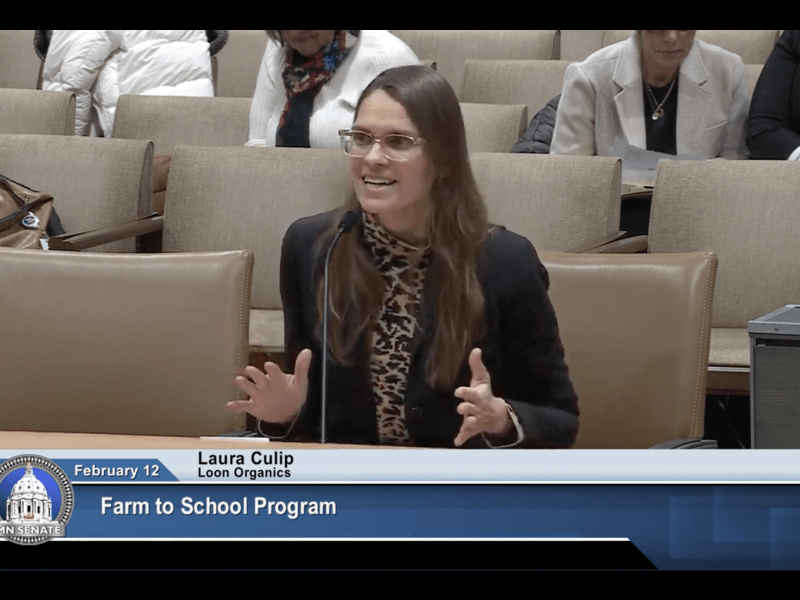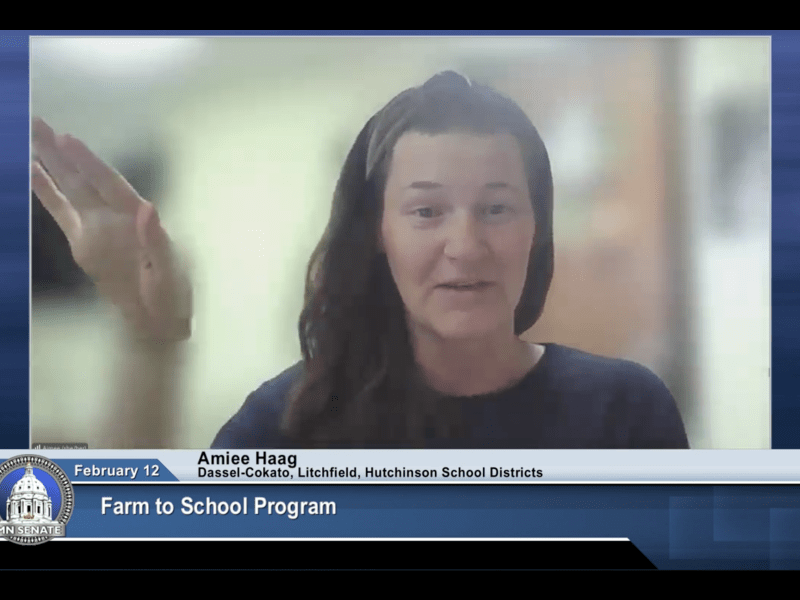Land Stewardship Project members Aimee Haag and Laura Cullip testify Wednesday, Feb. 12, during an informational state Senate hearing on Free School Meals in Minnesota and how Farm to School is bolstered through this critical program. For more on LSP’s Farm to School and community-based food systems work, click here. You can listen to an LSP Ear to the Ground podcast on Farm to School here.
Some key takeaways from today’s testimony:

Laura Cullip: She has been farming for over 20 years, selling into the Hutchinson, Litchfield, and Dassel-Cokato school districts for five years.
“We are grateful for the opportunity to sell our product locally. The majority of our farming career we’ve been selling direct-market. We’ve been driving into the Twin Cities, selling through CSA, and farmers’ markets; the ability to have a wholesale market open up for us within five miles of our farm, where our kids go to school, and be able to scale up some crops and grow those crops for our local school districts has been a huge benefit and support for our farm.
“It is a win-win. In my work with emerging farmers I hear from a lot of them that they are very interested in Farm to School. It provides an opportunity for them to tackle one of their biggest challenges, which is finding markets for their products as beginning, emerging farmers.
“I am also a parent. I have two kids who are in the Hutchinson public schools. Personally, we have benefitted from this program. As a family farm we have to be very thrifty, so having free school lunch has made a real difference in our family and on our pocketbook.
“We can open up access to local organic food so that all kids at school have better access. We’re increasing quality and access to local fresh food for kids without cost being a barrier.”
 Aimee Haag: She is the Farm to School coordinator for the Hutchinson, Litchfield, and Dassel-Cokato districts.
Aimee Haag: She is the Farm to School coordinator for the Hutchinson, Litchfield, and Dassel-Cokato districts.
“We have been at it for five years now. We have prioritized sourcing foods from all parts of the tray. That’s what we call the five different groups — the dairy, the grains, the proteins, the fruits and the vegetables. We have arrived at that place where we feel we are covering all of the tray.
“We are serving local food 12-months-of-the-year in our summer feeding program, school lunch, and school breakfast program. It has increased our food service participation, it has allowed us to invest in local businesses, and it has allowed us to build trust with our students.
“This investment allows us to move toward what students really want to see — they want quality. We realize this may be an uphill battle to rebrand and shatter the concept of what school food is in some families, but as everybody gathers in the cafeteria…we’ve really seen a culture shift in our cafeterias and our kitchens.
“Our Farm to School program and the stability of our funding because of universal free meals has allowed us to invest in local businesses and build a resilient food system.
“We began our program in 2020, so the Farm to School program is rooted in a moment when the supply chain was completely disrupted. We began Farm to School with a will and a commitment to change school food, but it really became a necessity very quickly. We still find ourselves there in that disruption and are unsure when it will level out.
“We are on track this year to hit the $1 million mark in our three small districts. That encompasses over 30 different fruits and vegetables, single-source carton-free milk, five different animal proteins —including turkey, lamb, and fish — flours, cornmeals, oats, rice, honey, maple syrup, and mushrooms; all while eliminating waste tremendously.
“We support hydroponic producers, as well as conventional and organic producers, and really prioritize this commitment to small-to-mid-sized family farms. Our investment in and our leadership around creating this local food system has built a system that can adapt.
“What I love about it so much is that students don’t want the product that industry thinks we need to buy. Students don’t want burritos wrapped in plastic, steamed in their plastic container. We’ve seen such a shift in how the students eat so we are able to respond. That further decreases waste. By working directly with our producers, they can also adapt their [production] models to what we know students want.
“The trust in our program and what we’re offering…has created an ability for students to feel comfortable and know what they can expect moving into the cafeteria. I think that is stability both for our students’ health and wellbeing, as well as for our local partners.”
LSP policy organizer Erin Dorbin can be contacted via e-mail.